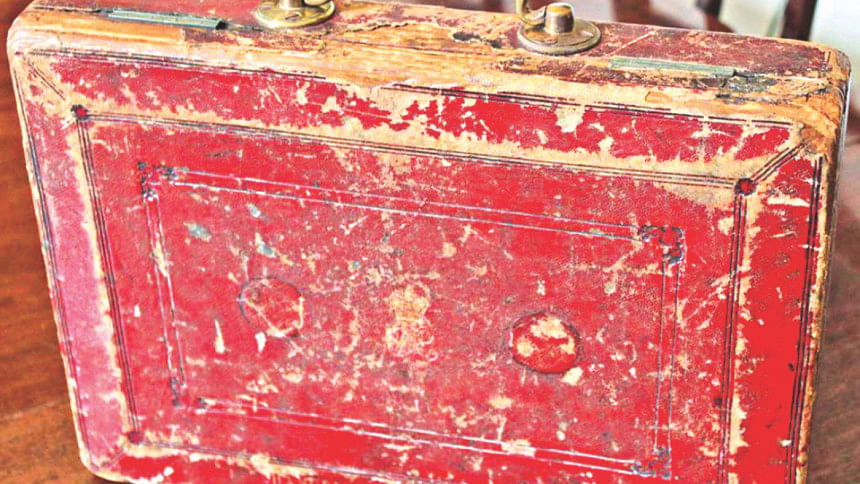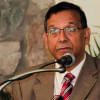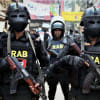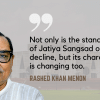Much ado about budget briefcase

It was a shock for British Chancellor of the Exchequer Ward Hunt when he stood up to deliver his budget speech in the House of Commons in 1868, opened the briefcase, and discovered he had left his speech at home.
It happened seven years after his predecessor William Gladstone introduced the briefcase for chancellor to carry budget statements to parliament. Gladstone was prime minister when this incident happened.
The original briefcase was made for Gladstone in around 1860 when he was chancellor, the chief financial minister.
The distinctive red briefcase, known as budget box, which chancellors used to carry their statements from Number 11 Downing Street, next door to Number 10, to the House of Commons, was in use for over 100 consecutive years.
Lord Callaghan was the first chancellor to break with custom in 1965 when he used a new box.
Chancellor George Osborne used the Gladstone's briefcase for his first budget in 2010 but used a new one in 2011.
This tradition has been followed by some commonwealth countries, including Bangladesh and India.
With a briefcase in his hand, Finance Minister AMA Muhith will enter parliament this afternoon. All eyes will be on him; what he brings out of his briefcase.
Even though it is not a magic box for sure, everyone will be expecting some good news from his briefcase.
Some of his proposals may generate praise and criticism. He is the finance minister, not Father Christmas and his briefcase carry no chocolate or gifts.
A finance ministry official close to Muhith said this year the minister would use a brown (chocolate colour) briefcase instead of the black he used in last six years.
Ministry officials used to bring some sample of briefcases from Baitul Mukarram market before every budget. Muhith chose one among them. This time he preferred the chocolate colour one, the official said.
All the briefcases he had used are preserved in his home with care. A finance ministry official said, adding that he might give them to a museum.
Muhith's predecessor late Saifur Rahman had placed 12 budgets in parliament during the governments-led by Ziaur Rahman, Abdus Sattar and Khaleda Zia.
A former finance ministry official who was close to Saifur said all his briefcases were preserved at the home of the former minister.
Saifur used a new briefcase every time to carry budget statements to parliament. The finance ministry officials collected them from different markets in the capital, said the former official.
India has also been following the Westminster tradition. But unlike in Britain, there is no single briefcase being passed on from one Indian finance minister to the next.
In early 1900's, one Canadian finance minister followed the Westminster tradition by entering the House of Commons with his "little red dispatch box".
The next four finance ministers of Canada did not continue the practice. Since 1960s, Canadian finance ministers started wearing new shoes on budget day. And it has become a practice there.
Budget day is crucial as well as special for any finance minister. He alone runs the show for the day.
By tradition, the British chancellors may drink alcohol during the budget speech if they wish. In the past, some have chosen to drink mineral water while other opted for whiskey, gin and tonic, and brandy.
Drinking something except water is prohibited inside our parliament. One may drink water taking permission of the Speaker. Muhith may drink water after he starts the budget speech.
There is a fundamental difference in dealing with the budgetary proposals between UK, India and Bangladesh.
In UK and India, MPs get adequate time to discuss and scrutinise the proposed budget both in the chamber and in the committee levels.
They give high importance on the proposals. It is because the national budget is not just a technical instrument compiling income and expenditure. It outlines the government's views of the socio-economic state of the nation.
The budget is a critically important document in ensuring transparency, accountability, comprehensiveness and good governance.
By providing a detailed description of proposed expenditure, this allows parliament and the people to "know where the money goes" and thus increases transparency.
But the practice in Bangladesh is different. No parliamentary committee is allowed to scrutinise the budgetary proposals. MPs get scope to join the discussion on the budget in the chamber.
Yet, MPs speak little on the issue as they spend most of the time either by launching verbal attack on their political opponents or praising their government and top leaders.
This practice keeps destroying the significance of placing budgetary proposals in parliament, turning the Jatiya Sangsad into a rubber stamp.

 For all latest news, follow The Daily Star's Google News channel.
For all latest news, follow The Daily Star's Google News channel. 








Comments